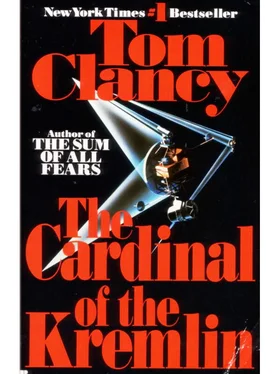Tom Clancy - The Cardinal of the Kremlin
Здесь есть возможность читать онлайн «Tom Clancy - The Cardinal of the Kremlin» весь текст электронной книги совершенно бесплатно (целиком полную версию без сокращений). В некоторых случаях можно слушать аудио, скачать через торрент в формате fb2 и присутствует краткое содержание. Год выпуска: 1988, Жанр: Триллер, на английском языке. Описание произведения, (предисловие) а так же отзывы посетителей доступны на портале библиотеки ЛибКат.
- Название:The Cardinal of the Kremlin
- Автор:
- Жанр:
- Год:1988
- ISBN:нет данных
- Рейтинг книги:3 / 5. Голосов: 1
-
Избранное:Добавить в избранное
- Отзывы:
-
Ваша оценка:
- 60
- 1
- 2
- 3
- 4
- 5
The Cardinal of the Kremlin: краткое содержание, описание и аннотация
Предлагаем к чтению аннотацию, описание, краткое содержание или предисловие (зависит от того, что написал сам автор книги «The Cardinal of the Kremlin»). Если вы не нашли необходимую информацию о книге — напишите в комментариях, мы постараемся отыскать её.
The Cardinal of the Kremlin — читать онлайн бесплатно полную книгу (весь текст) целиком
Ниже представлен текст книги, разбитый по страницам. Система сохранения места последней прочитанной страницы, позволяет с удобством читать онлайн бесплатно книгу «The Cardinal of the Kremlin», без необходимости каждый раз заново искать на чём Вы остановились. Поставьте закладку, и сможете в любой момент перейти на страницу, на которой закончили чтение.
Интервал:
Закладка:
"I heard what happened at Ghazni," the CIA officer said.
"God's will. This Russian, he lost a son. I could not – perhaps I had killed enough for one day." The Archer let out a long breath. "Will he be useful?"
"These are." Ortiz was already riffling through the documents. "My friend, you do not know what you have done. Well, shall we talk about the last two weeks?"
The debrief took until dawn. The Archer took out his diary and went over everything he'd done, pausing only while Ortiz changed tapes in his recorder.
"That light you saw in the sky."
"Yes… it seemed very strange," the Archer said, rubbing his eyes.
"The man you brought out was going there. Here is the base diagram."
"Where is it, exactly – and what is it?"
"I don't know, but it's only about a hundred kilometers from the Afghan border. I can show you on the map. How long will you be staying on this side?"
"Perhaps a week," the Archer answered.
"I must report this to my superiors. They may want to see you. My friend, you will be greatly rewarded. Make a list of what you need. A long list."
"And the Russian?"
"We will talk to him, too. If he lives."
The courier walked down Lazovskiy Pereulok, waiting for his contact. His own hopes were both high and low. He actually believed his interrogator, and by later afternoon he'd taken the chalk that he used and made the proper mark in the proper place. He knew that he'd done so five hours later than he was supposed to, but hoped that his controller would put that off to the evasion process. He hadn't made the false mark, the one that would warn the CIA officer that he'd been turned. No, he was playing too dangerous a game now. So he walked along the dreary sidewalk, waiting for his handler to show up for the clandestine meet.
What he didn't know was that his handler was sitting in his office at the American Embassy, and would not travel to this part of Moscow for several weeks. There were no plans to contact the courier for at least that long. The CARDINAL line was gone. So far as CIA was concerned, it might never have existed.
"I think we're wasting our time," the interrogator said. He and another senior officer of the Second Directorate sat by the window of an apartment. At the next window was another "Two" man with a camera. He and the other senior officer had learned this morning what Bright Star was, and the General who commanded the Second Chief Directorate had given this case the highest possible priority. A leak of colossal proportions had been uncovered by that broken-down war-horse from "One."
"You think he lied to you?"
"No. This one was easy to break – and, no, it was not too easy. He broke," the interrogator said confidently. "I think we failed to get him back on the street quickly enough. I think they know, and I think they've broken off the line."
"But what went wrong – I mean from their point of view, it might have been routine."
" Da ." The interrogator nodded agreement. "But we know that the information is highly sensitive. So, too, must be its source. They have therefore taken extraordinary measures to protect it. We cannot do things the easy way now."
"Bring him in, then?"
"Yes." A car drove up to the man. They watched him get in before they walked to their own vehicle.
Within thirty minutes they were all back in Lefortovo Prison. The interrogator's face was sad.
"Tell me, why is it I think that you have lied to me?" the man asked.
"But I have not! I did everything I was supposed to do. Perhaps I was late, but I told you that."
"And the signal you left, was it the one to tell them that we had you?"
" No! " The courier nearly panicked. "I explained all of that, too."
"The problem, you see, is that we cannot tell the difference between one chalk mark and another. If you are being clever, you may have deceived us." The interrogator leaned forward. "Comrade, you can deceive us. Anyone can – for a time. But not a very long time." He paused to let that thought hover in the air for a minute. It was so easy, interrogating the weak ones. Give hope, then take it away; restore it, and remove it yet again. Take their spirits up and down until they no longer knew which was which – and, lacking a measure of their own feelings, those feelings became yours to use.
"We begin again. The woman you meet on the train – who is she?"
"I do not know her name. She is over thirty, but young for her age. Fair hair, slim and pretty. She is always dressed well, like a foreigner, but she is not a foreigner."
"Dressed like a foreigner – how?"
"Her coat is usually Western. You can tell from the cut and the cloth. She is pretty, as I have said, and she–"
"Go on," the interrogator said.
"The signal is that I put my hand on her rump. She likes it, I think. Often she presses back against my hand."
The interrogator hadn't heard that detail before, but he immediately deemed it the truth. Details like that one were never made up, and it fitted the profile. The female contact was an adventuress. She was not a true professional, not if she reacted like that. And that probably – almost certainly – made her a Russian.
"How many times have you met her like this?"
"Only five. Never the same day of the week, and not on a regular schedule, but always on the second car of the same train."
"And the man you pass it to?"
"I never see his face, not all of it, I mean. He is always standing with his hand on the bar, and he moves his face to keep his arm between it and me. I have seen some of it, but not all. He is foreign, I think, but I don't know what nationality."
"Five times, and you have never seen his face!" the voice boomed, and a fist slammed down on the table. "Do you take me for a fool!"
The courier cringed, then spoke rapidly. "He wears glasses; they are Western, I am sure of it. He usually wears a hat. Also, he has a paper folded, Izvestia , always Izvestia . Between that and his arm, you cannot see more than a quarter of his face. His go-ahead signal is to turn the paper slightly, as though to follow a story, then he turns away to shield his face."
"How is the pass made, again!"
"As the train stops, he comes forward, as though to get ready to leave at the next station. I have the thing in my hand, and he takes it from behind as I start to leave."
"So, you know her face, but she does not know yours. He knows your face, but you do not know his…" The same method that this one uses to make his pickup. That's a nice piece of fieldcraft, but why do they use the same technique twice on the same line? The KGB used this one too, of course, but it was harder than other methods, doubly so on the Metro's crowded, frantic rush-hour schedule. He was beginning to think that the most common means of transferring information, the dead-drop, wasn't part of this line. That, too, was very curious. There should have been at least one dead-drop, else the KGB could roll up the line – maybe…
They were already trying to identify the source of the leak, of course, but they had to be careful. There was always the possibility that the spy was himself (or herself?) a security officer. That was, indeed, the ideal post for an intelligence agent, since with the job came access to everything, plus foreknowledge of any counterintelligence operations under way. It had happened before – the investigation of a leak had itself alerted the spy, a fact not discovered until some years after the investigation had been terminated. The other really odd thing was that the one photographic frame they had was not of a real diagram, but rather of a hand-drawn one…
Handwriting – was that the reason that there were no dead-drops? The spy could be identified that way, couldn't he? What a foolish way to –
Читать дальшеИнтервал:
Закладка:
Похожие книги на «The Cardinal of the Kremlin»
Представляем Вашему вниманию похожие книги на «The Cardinal of the Kremlin» списком для выбора. Мы отобрали схожую по названию и смыслу литературу в надежде предоставить читателям больше вариантов отыскать новые, интересные, ещё непрочитанные произведения.
Обсуждение, отзывы о книге «The Cardinal of the Kremlin» и просто собственные мнения читателей. Оставьте ваши комментарии, напишите, что Вы думаете о произведении, его смысле или главных героях. Укажите что конкретно понравилось, а что нет, и почему Вы так считаете.






![Александр Ирвин - Tom Clancy’s The Division 2. Фальшивый рассвет [litres]](/books/417744/aleksandr-irvin-tom-clancy-s-the-division-2-falsh-thumb.webp)





